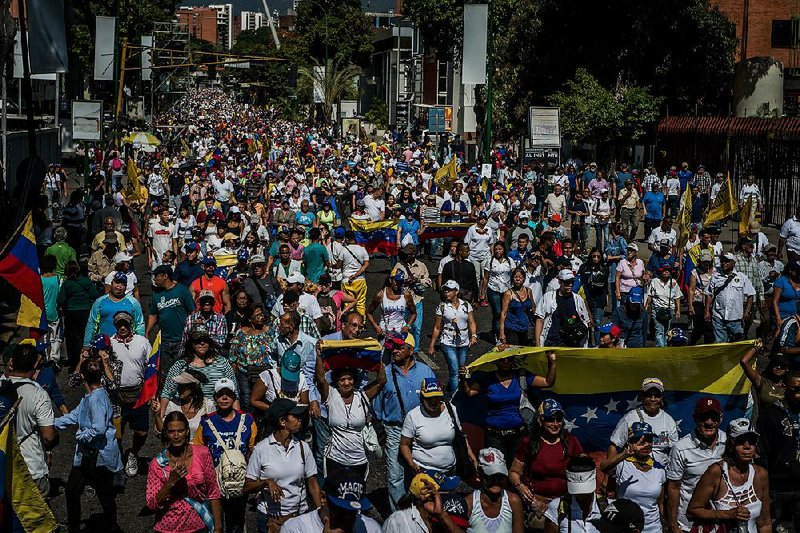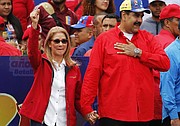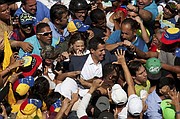CARACAS, Venezuela -- Venezuela's opposition leader called on more members of the military to abandon the country's socialist government after Saturday's defection of a high-ranking general, and President Nicolas Maduro proposed holding early National Assembly elections.
Maduro's call for early legislative voting is likely to intensify a political standoff with rival Juan Guaido, who leads the opposition-controlled National Assembly and is demanding a new presidential election. Guaido declared himself Venezuela's legitimate ruler on Jan. 23, and he has the support of Washington and most South American nations.
Speaking from behind a lectern decorated with Venezuela's presidential seal, Guaido told supporters that he would continue his opposition movement in the streets until Maduro stopped "usurping" the country's presidency and agreed to a presidential election overseen by international observers.
On Saturday, tens of thousands of Venezuelans joined opposition protests against Maduro in Caracas and other cities.
The outpouring appeared to be one of the largest demonstrations against Maduro and illustrates the deep crises facing Venezuela under his leadership. Hyperinflation and shortages of food and medicines have fueled hunger, diseases and a historic outflow of migrants.
Guaido called Saturday on "blocks" of the military to defect from Maduro's administration and "get on the side of the Venezuelan people."
"We don't just want you to stop shooting at protesters," Guaido said. "We want you to be part of the reconstruction of Venezuela."
He said that in the coming days, the opposition would try to move humanitarian aid into the country by land and sea along three border points, including the Colombian city of Cucuta. He described the move as a "test" for Venezuela's armed forces, which will have to choose if they allow the aid to pass, or if they instead obey the orders of Maduro's government.
Maduro also dug in his heels, insisting that he is the only president of Venezuela and describing Saturday's anti-government protests as part of a U.S.-led coup attempt.
"I agree that the legislative power of the country be re-legitimized and that we hold free elections with guarantees, and the people choose a new National Assembly," Maduro said at a pro-government demonstration in Caracas. The opposition controls the National Assembly while government supporters control the powerful Constituent Assembly.
The socialist leader also had words for the administration of President Donald Trump, which recently imposed sanctions on Venezuelan oil exports to undermine Maduro's main source of income and weaken his grip on power.
"Do you think you are the emperor of the world?" he asked Trump. "Do you think Venezuela is going to give up and obey your orders? We will not surrender."
On Saturday, Maduro said he was willing to sit down for talks with the opposition to promote national "harmony."
But that offer has been rejected by Guaido, who describes it as a ploy by the Maduro administration to buy time.
Previous talks between the government and opposition have failed to change electoral conditions in the South American country, and many political leaders have been forced into exile.
GENERAL DEFECTS
Earlier Saturday, a Venezuelan air force general defected from Maduro's administration and called on his compatriots to participate in protests against the socialist leader's rule.
Gen. Francisco Yanez is the first high-ranking officer to leave Maduro's government since Jan. 23, when Guaido declared himself the country's legitimate interim leader by invoking two articles of the Venezuelan constitution that he says give him the right to assume presidential powers.
In a YouTube video, Yanez described Maduro as a dictator and referred to Guaido as his president. He didn't say if he was still in Venezuela or had left the country.
The officer confirmed in a phone call with The Associated Press, from a Colombian number, the veracity of his declaration and said he would not provide further statements until given authorization by "the commander-in-chief of the legal armed force, which is President Juan Guaido."
The military controls some of Venezuela's key assets, including the state-run oil company, and until now, its top brass has helped Maduro to survive rounds of mass protests in 2014 and 2017 by jailing activists and repressing protesters.
Yanez said in his video that "90 percent of the military" is against Maduro, but it is unclear how many servicemen will actively support the opposition.
Shortly after protests broke out against Maduro last month, Venezuela's most important regional military commanders and its defense minister issued a statement in support of Maduro, describing Guaido as a coup monger backed by Washington.
The Twitter account of Venezuela's air force, which consistently retweets Maduro and other government officials, released a photo of the video with the word "traitor" in red letters over Yanez's face.
"We have to highlight that he has no command over troops and less so over air force units," an air force tweet said.
"He has no leadership at the air force and was only serving planning functions."
Antonio Rivero, a former Venezuelan general now living in exile in Miami, said Yanez did not appear to command a large contingent of troops, and his strategy remained unclear.
"For now, I see him isolated. He doesn't have a division behind him," Rivero said.
APPEAL TO 'CHAVISTAS'
For the opposition, the protests Saturday marked a key step forward in its ability to sustain a social uprising against Maduro. The anointed successor of leftist Hugo Chavez, who died in 2013, Maduro was sworn in for a new six-year term last month after elections internationally criticized as fraudulent.
Speaking to the masses, Guaido appealed to "Chavistas" -- or those who have long supported Chavez.
"I want to send a message to the Chavista people," Guaido said. "You believed in a project, and now you've been disappointed." He added: "The military and the world take note, there are many, many people filling the streets of Venezuela today. This movement is historic, and unstoppable."
To rally on his side, Maduro also called supporters into the streets for counterprotests marking 20 years of socialist rule.
At the pro-government march in central Caracas, there were about 300 people at 10:30 a.m. Dressed in red and carrying ruling party flags, they were marching toward the presidential palace.
"Our people, once again, overflowing this avenue," Maduro said, addressing his supporters. "Those who accuse us of being a dictatorship must know that since the foundation of the revolution, we have become a profoundly free and democratic people. Venezuela will never have a dictatorship."
At the pro-government rally, people in the crowd shouted, "Prison for Guaido." Maduro responded by suggesting that he still has moves to make.
"Everything at its right time," he told supporters. "We know what we have to do in every moment. Justice sometimes takes time, but it comes."
Maduro supporters at the rally blamed the opposition for undermining the Bolivarian Revolution with years of protests and seeking financial sanctions against the Venezuelan government.
Zeleyka Muskus, a 53-year-old tax collector from Caracas, said opposition forces were responsible for the country's current economic woes, saying they have staged years of protests that have gotten people injured and killed.
"Chavez is the love of my life," she said.
Other public workers attending the pro-government demonstration said they had been forced to go there by their bosses.
Meanwhile, streams of marchers from middle-class and poor neighborhoods walked to another part of the capital and said they were demanding Maduro's resignation and a transitional government that would hold new presidential elections.
Throngs of demonstrators converged on Avenida Las Mercedes, a wide boulevard in a middle-class Caracas neighborhood. Many carried yellow, blue and red Venezuelan flags and banners supporting democracy. One man knelt in prayer before a sign that read, "This struggle is for those who have fallen and for our Fatherland."
"We are marching because we can't take this situation anymore," said Carmen Sanchez, a 42-year-old woman who lives in the slum of Petare.
"We don't have enough money for food. This government has to resign for Venezuela to be beautiful again, and I have faith Guaido will bring us success," Sanchez said.
Although official media did not broadcast the protests, government forces appeared to be using relative restraint in crowd control, though some melees were reported among small groups of opposition protesters and security forces.
Xiomara Espinoza, 59, said she felt a change of energy in the crowd, whose hopes for a transition in Venezuela have previously been dashed.
"We are around the corner from freedom," she said, banging on a pot and wearing a Venezuelan flag.
"This is our best political opportunity," said Margarita Lopez Maya, a retired political scientist in Caracas who has spent decades studying the strongmen of the country's past and who headed out Saturday to join the crowds. "Right now, it's the moment of the citizens."
Information for this article was contributed by Manuel Rueda, Fabiola Sanchez, Scott Smith, Joshua Goodman and Jorge Rueda of The Associated Press; by Mariana Zuniga, Anthony Faiola and Rachelle Krygier of The Washington Post; and by Ana Vanessa Herrero and Nicholas Casey of The New York Times.
A Section on 02/03/2019


